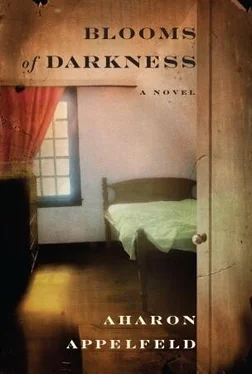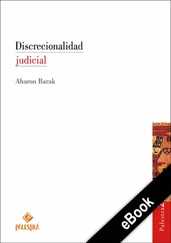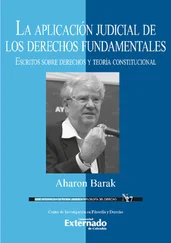“What happened, Mama?” he asks.
“It was suffocating, and you felt ill.”
“I don’t remember anything.”
“There’s nothing to remember.” His mother tries to distract him.
Hugo will think a great deal about that dark night, trying to tie the details together, and he will wonder again and again how his mother had managed to pull him out of the sewer and restore him to life.
But meanwhile, it’s dangerous to linger in the open field. They make their way, hunched over, to a nearby grove of trees. Every few minutes they stop, kneel, and listen.
“Mariana works at night, and you have to get used to being alone.” His mother reveals another detail to him.
“I’ll read, and I’ll do arithmetic problems.”
“I hope that Mariana has a light in the closet,” she says in a trembling voice.
“When will you come and see me?”
“That doesn’t depend on me,” she says without emphasizing any word in the sentence.
Then they take a break and sit without talking, and it seems to Hugo as if many hours have passed since they left the cellar, were in the sewer, and clambered out of it.
“Will Papa also come and visit me?” he asks, hurting his mother without knowing it.
“It’s very dangerous to wander around outdoors, don’t you see?”
“And after the war, will you come and visit me?”
“We’ll come right away. We won’t delay even a minute,” she says, and she’s glad that this time she’s found the correct words.
Then she tells him that she doesn’t intend to go back home. She will go to the nearby village. She has a friend there, someone with whom she’d gone to school, and maybe this friend will agree to hide her until the troubles are over. If that friend doesn’t agree, she will go to the village of Khlinitsia, where a woman who was a servant in Hugo’s grandparents’ house lives, an old woman with a good temperament.
“Why can’t you stay with me?”
“There isn’t room for me.”
Then she speaks in a torrent, as though she were reading out loud or reciting. Hugo doesn’t understand anything she is talking about. He only senses that she wants to tell him something that’s hard to reveal. It’s her voice, but not her usual voice.
“Mama.”
“What?”
“And you’ll come to visit me?” The words burst from his mouth.
“Certainly I’ll come. Do you have any doubt?”
The silence mingles with the darkness, and the smell of the damp grass rises from the soft ground. “Autumn,” says his mother, and her voice wipes away the memory of the stifling sewer and the fears of the night. Other sights, silent and enchanting, rise from oblivion.
In the autumn they used to go for a week in the Carpathians, to see the fallen leaves. The autumn lay on the earth in a myriad of hues, and they would step slowly, so as not to destroy the big leaves that floated in bright colors, detached from the trees. Hugo’s father would bend over, pick up a leaf, and say, “A waste.”
“A waste of what?” His mother’s question came promptly. “Of this beauty.”
Other marvelous things were said then, but Hugo didn’t take them in, or maybe he didn’t retain them. His contacts with his parents at those times were delicate and soft, and what was said sank into him.
For a moment it seems to Hugo that his mother is about to say, It’s late, let’s go home. We were wrong, but we can correct the error . His mother sometimes used sentences like that, expressions of her optimism. His father liked that sentence and would try to adopt it in his own way.
“How do you feel?” she asks, looking at Hugo with her eyes wide open.
“Excellent.”
“Thank God. In half an hour we’ll be at Mariana’s.” Hugo, flooded by memories of the Carpathians, tries to delay the parting and says, “Why rush?”
“Mariana is waiting for us. I wouldn’t want to delay her. It’s late.”
“Just a little.”
“We can’t, dear. The way was long, beyond what I had thought.” Hugo knows that phrase, “beyond what I had thought,” but this time it seems as if it has been plucked out of another place and another time.
“What time is it?” Hugo asks.
“It’s two-thirty, after midnight.”
Strange, the thought flits through his mind, why did his mother say “after midnight”? There was no light in the whole area. Everything was night. Why say “after midnight”? Wasn’t that self-evident?
“It’s very late. I wouldn’t want to bother Mariana too much. But if we make an effort, we’ll be there in half an hour,” his mother says softly.
Hugo’s mother was right. Before long, they are standing by a narrow wooden door. His mother knocks, and to the question in a woman’s voice, she answers, “Julia.”
The door opens, and a tall woman, dressed in a long nightgown, stands at the entrance.
“We got here,” says his mother.
“Come in.”
“I won’t disturb you. Hugo’s clothes are in the suitcase, and there are books and games in the knapsack. We came through the sewer pipes. I hope the clothes didn’t get dirty. You know Hugo?”
“He’s grown since I last saw him,” she says, and looks at him.
“He’s a good boy.”
“I’m sure.”
“Mariana will watch over you. She remembers you from when you were very little.”
“Mama,” Hugo says, as though his lips have stopped him from saying more.
“I have to leave immediately and get to the village before dawn.” She speaks with strange haste and takes something shiny out of her handbag and hands it to Mariana.
“What’s this?” says Mariana, without looking at the jewelry.
“It’s for you.”
“Good God. And you?”
“I’m going away from here to Sarina, and I hope to get there before sunrise.”
“Be careful,” says Mariana, and she hugs Hugo’s mother.
“Hugo, dear,” she says, “always be quiet and polite. Don’t bother with questions and don’t ask for anything. Always say please and always say thank you.” The words are choked in her throat.
“Mama.” He tries to keep her for another minute.
“I have to go. Take care of yourself, dear,” she says, kisses his forehead, and separates herself from him.
Mama , he is about to call out again, but the word is blocked in his mouth.
Hugo manages to see her go away. She walks stooped over, making a way for herself through the bushes. When she is swallowed up in the thick darkness, Mariana closes the door.
That is the break, but Hugo doesn’t feel it. Perhaps because of the night chill that his body had soaked up, or because of his fatigue. He is very confused and says, “Mama left.”
“She’ll come back,” says Mariana, not meaning it.
“Is it far to the village?” he asks, breaking the first rule that his mother drilled into him.
“Don’t worry about your mother. She’s experienced. She’ll find a way.”
“Sorry.” He tries to fix things.
“You’re surely tired,” Mariana says, letting him into the closet, a long, narrow space without windows. At first sight it looks like the roomy pantry in Hugo’s house. But the strong smell of sheepskins immediately reminds him of the shoemaker’s cellar, where his mother brought shoes to be repaired every few months.
“This will be your bedroom. Can I bring you something to drink?”
“Thanks, there’s no need.”
“I’ll bring you some soup.”
Hugo surveys the closet, and on his second look he discovers colorful nightgowns suspended from hangers, a few pairs of shoes, and, on a surface like a bench, scattered silk stockings, a corset, and a brassiere. Those women’s things amuse his eyes for a moment.
Читать дальше












